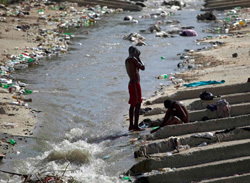
Catholic Relief Services (CRS) in Haiti has asked the University of Notre Dame’s Eck Institute for Global Health to evaluate one of its cholera programs implemented after the deadly fall 2010 outbreak that began in the aftermath of the catastrophic 7.0 earthquake.
Incoming students Annette Ruth and Lindsey McAlarnen, who will join Notre Dame’s new Master of Science in Global Health degree program in the fall, are in Haiti with project leader Juan Carlos Guzmán, a member of the Eck Institute and director of research for the Institute for Latino Studies to evaluate the programs.
“Our work is very important for the Haitian population because the success of the campaign will reduce the number of cholera cases,” said Guzmán. “Also, it’s a way to make sure resources dedicated to Haiti are having the intended outcome.”
CRS, among other institutions, quickly assembled a campaign to prevent the spread of disease with the support of USAID’s Office of Foreign Disaster Assistance (OFDA). The group will work to help CRS and its partner institutions measure the success of the campaign and uncover weaknesses that must be corrected to increase the campaign’s effectiveness.
Guzmán and the students are conducting surveys in hospitals to gauge people’s understanding of cholera, including its symptoms, treatment and prevention. They will also observe whether Haitians are changing personal hygiene behaviors, treating drinking water and properly disposing of fecal waste to help prevent the disease.
“This will give us an estimate of the efficacy of social mobilization with regard to the outbreak,” Ruth says. “Messages were disseminated regarding cholera prevention, ways to seek healthcare in the event of infection, and the proper use and preparation of oral rehydration salts and homemade sugar-salt solutions. We hope the results of this survey will help CRS and other agencies determine the most effective ways of distributing potentially life-saving information to the at-risk population.”
Cholera is an infectious and often fatal bacterial disease of the small intestine. Typically contracted from infected water supplies, it can cause severe vomiting and diarrhea that can lead to dehydration, and tends to be most deadly for children and elderly people.
The Haitian epidemic has affected more than 330,000 people and claimed more than 5,300 lives.
The Master of Science in Global Health degree program is a science-centric program based primarily in the College of Science and administered by the Eck Institute. The program will begin with 13 students and is anticipated to grow to 25 students, with its curriculum eventually involving collaborations with Notre Dame’s College of Engineering, College of Arts and Letters, Law School and Mendoza College of Business.
Only three similar programs operate in the United States, with the Notre Dame program uniquely focused on basic science, health and the poor.
“We have the opportunity to conduct global health research that will not only help launch my graduate coursework but will more importantly enable us as representatives of Notre Dame to immediately make an impact in Haiti,” McAlarnen said.
The three will return to campus on June 18.
Both McAlarnen and Ruth are blogging about their experiences in Haiti. To view McAlarnen’s blog, click here. To view Ruth’s blog, click here.